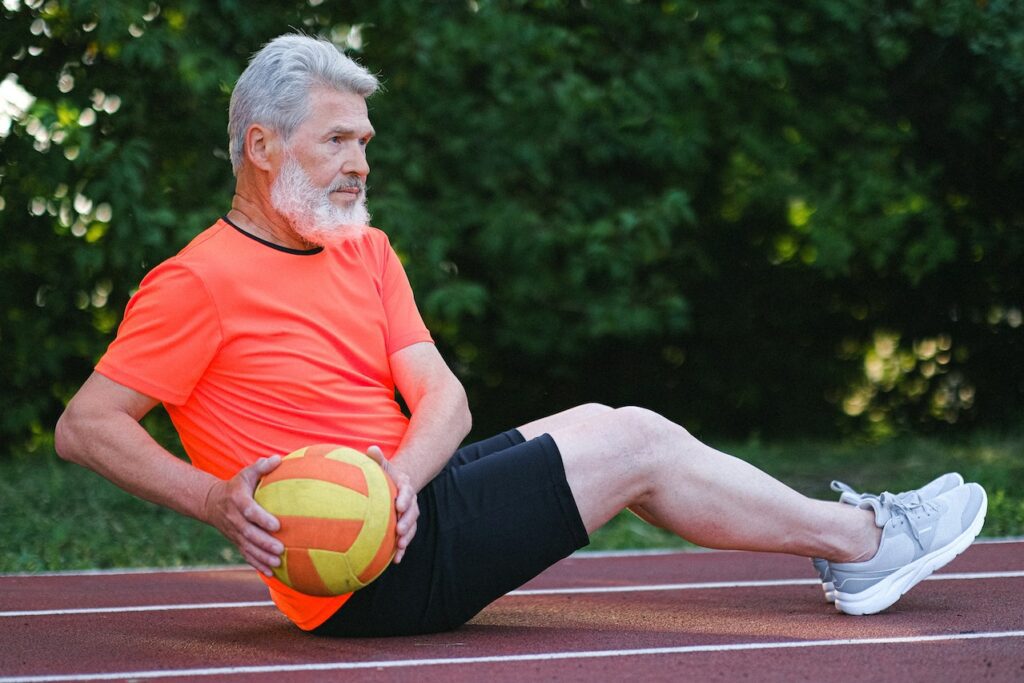Retirement is anticipated because it promises leisure, contentment, and the opportunity to pursue passions. We can now relax and appreciate our hard work. Retirement presents exciting prospects, but maintaining excellent physical health is essential for a satisfying and lively retirement.Retirement alters our bodies. Our physical capacities decline with age, making our health even more important. We can protect our health and enjoy this new chapter by knowing what might harm us.
This article discusses nine behaviors that might affect retirees’ physical health. Retirees may make educated decisions that enhance their well-being and allow them to enjoy active and full lives by identifying and resolving these possible dangers. We will discuss the hazards of sedentary lives and bad behaviors and provide solutions. If you’re ready, let’s begin!

Sedentary Life
Despite its appeal in retirement, a sedentary lifestyle might harm our health. Sitting or doing little exercise puts us at risk for several health problems. Sedentary lifestyles have serious risks. It raises the risk of obesity, heart disease, diabetes, and some cancers. Muscle weakening, joint stiffness, and diminished flexibility make daily chores harder as we age.
Prolonged sitting or inactivity has far-reaching effects. It impacts our health. Sedentary people lose out on the many advantages of exercise. Physical exercise promotes balance, coordination, blood circulation, and weight management. Sedentary lifestyles impede metabolism, causing weight gain, chronic illness, and lower fitness levels.
Sedentary lifestyles have far-reaching effects. They also affect mental health, according to research. Sitting increases the risk of cardiovascular disease, including excessive blood pressure and cholesterol. Poor posture, back discomfort, and musculoskeletal disorders may result. Oversitting and inactivity have also been linked to sadness, anxiety, and cognitive deterioration in retirees.
Bad Diet
Retirement health depends on a balanced diet. Our diets provide the nutrients our bodies need to operate properly, live longer, and prevent chronic illnesses. A balanced diet supports a healthy, active retirement.
Retirement might provide nutritional concerns. Dietary mistakes are typical throughout this stage of life. Retirees may overeat due to increased leisure time and fewer dietary limitations. Processed, sugary, and high-fat foods are seductive. These decisions may lead to weight gain, dietary shortages, and chronic illnesses, harming our physical health.
Retirement may also upset patterns, making meal planning difficult and increasing dependence on convenience foods and takeaway. Poor meal choices, nutritional diversity, and nutrient imbalance may ensue. Elderly people may not consume enough water, causing dehydration. Dehydration may harm digestion, circulation, and general health.
Prioritizing specific techniques might help retirees avoid these nutritional mistakes and eat well. Healthy diets focus on full, unprocessed foods. Vitamins, minerals, fiber, and antioxidants from whole grains, fresh produce, lean meats, and healthy fats boost general health.
- Planning and preparing meals is vital. Planning and making meals at home lets you control ingredients, portions, and cooking techniques. This improves diet and minimizes processed food consumption.
- Stay hydrated. Drinking enough water throughout the day aids digestion, body processes, and energy. Reusable water bottles remind you to drink.
- Maintaining equilibrium is essential. Avoid processed meals, sugary snacks, and sugary drinks. Whole foods are healthier and more nutritious.
- Diversifying nutrients is essential. Fruits, vegetables, entire grains, lean meats, and healthy fats provide a balanced diet. Nutrient-rich foods encourage good health and provide several advantages.
A trained dietician or healthcare professional may provide tailored advice and assistance. Based on requirements, nutrition, and health, they may provide suggestions.
Smoking
Smoking harms our health, even in retirement, and we must face it.
Smoking has far-reaching health impacts. It causes avoidable illnesses and early mortality. Cigarette poisons damage virtually every organ with each inhale. Smoking causes COPD and lung cancer, which harm the lungs the most. The damage continues. Smoking causes heart disease, stroke, and many cancers, including those of the mouth, throat, esophagus, bladder, and pancreas.
Smoking causes more than illnesses. It causes premature wrinkles, poor skin, and brittle hair. Smokers’ immune systems weaken, making them more susceptible to infections and respiratory diseases. Smoking constricts blood arteries, reducing blood flow to the extremities. Peripheral artery disease may cause leg discomfort and non-healing wounds.
Despite common opinion, quitting smoking at any age has real benefits. Quitting lowers heart rate and blood pressure. Lung function improves within days, lowering heart attack and stroke risk. Smoking-related illnesses decrease with time.
There are several options to help retirees stop smoking. Healthcare practitioners, smoking cessation programs, and specialized support groups may provide assistance, counseling, and resources. Nicotine replacement therapy (NRT) including patches, gum, lozenges, or inhalers may help with withdrawal and cravings.
Alcohol Abuse
Alcohol may be enjoyed or overdone. Drinking socially and relaxingly is OK, but excessive drinking might harm our health. Risks affect several facets of our health.
Alcohol abuse causes liver and mental health damage too. It may worsen despair and anxiety. Heavy drinking increases the chances of cognitive decline, memory issues, and dementia later in life. Disrupted sleep patterns may cause sleep disorders.
Moderation and cautious drinking are crucial. Moderation involves following alcohol rules. For most people, this is one drink per day for women and two for men. It is important to consider individual situations, health concerns, and medicines that may need significantly reduced alcohol consumption or full abstention.
Responsible drinking goes beyond moderation and includes knowing the health risks of alcohol. It involves making educated decisions, establishing personal boundaries, and recognizing circumstances when alcohol might interfere with prescriptions, medical problems, or occupations that need full cognitive function.
Lack of Sleep
Sleep is essential for good health, particularly in retirement. Sleep repairs and rejuvenates our bodies. Sleep boosts our immune system, hormones, cardiovascular health, and cognitive performance. Adequate sleep helps maintain energy, weight, and the risk of chronic illnesses, including diabetes, heart disease, and obesity. Sleep deprivation may harm our physical health.
Retirement changes routine and lifestyle, which might affect sleep. During this stage, sleep problems are prevalent. Changes in daily schedules, lack of established work routines, or increased leisure activities may disrupt sleep-wake rhythms, making it hard to establish a sleep habit. Retirement pressures, such as financial worries and lifestyle changes, may cause anxiety and sleep issues. Sleep apnea, restless leg syndrome, and chronic pain, which are more common in older persons, may also impair sleep.
Seek medical help if sleep disorders continue or impair your quality of life. See a sleep specialist. They can diagnose, treat, or refer you to a sleep expert.
ALSO CHECK OUT: Create a Daily Routine for Aging Well in 6 Steps
Overexertion
Staying active and avoiding overexertion in retirement is key. To maintain or recover fitness, we overexert our bodies. Pushing too hard might harm our physical health, jeopardizing our well-being.
Exhaustion, tiredness, and a compromised immune system from overexertion make us more susceptible to sickness. Chronic joint discomfort, inflammation, and overuse injuries may also develop from overtraining. Overexertion increases stress, which may hurt our physical and emotional health and ruin our retirement.
Retirement health requires listening to our body and understanding their limits. Our body can tell us when we’re overworking or need a break. These warning signs—pain, weariness, dizziness, shortness of breath, or overall uneasiness during physical activity—must be taken seriously. Ignoring these signs might do more harm. We can avoid overexertion and encourage safer, more sustainable exercise by listening to our bodies.
Breaks and rest are essential. Rest and recuperation are vital to a balanced workout. They allow muscles to recover and strengthen. Rest helps our cardiovascular and respiratory systems recuperate for maximum performance. We may avoid burnout by taking frequent breaks from our workouts. This lets us have a fun and regular training routine in retirement.
Many exercises improve fitness without overexertion. Finding balance requires selecting the correct workouts. Try these:
- Walking, swimming, cycling, and elliptical machines are low-impact, joint-friendly workouts. These exercises improve cardiovascular health without straining the body.
- Strengthen using weights, resistance bands, or bodyweight. Maintaining muscular strength and tone helps stabilize joints and prevent age-related muscle loss.
- Flexibility and balance exercises increase mobility and minimize fall risk. Yoga, Pilates, and tai chi increase flexibility, balance, and relaxation.
- Alternate between high-intensity and low-intensity intervals. This method allows for hard bursts followed by active recovery, preventing overexertion while yet giving cardiovascular advantages.
- Join recreational sports teams or retiree-specific workout sessions. These activities promote healthy competitiveness and socialization.
Skipping Checkups
Enjoying our hard work and newfound independence is retirement. However, frequent medical checkups and screenings are vital at this time of life. As we age, health maintenance becomes more important.
Preventive medical checkups are essential. They let doctors to evaluate our health, spot early problems, and treat them. These check-ups enable doctors to monitor vital signs, do blood tests, and propose screenings to discover risk factors and health issues. Regular checkups allow us to make health and wellness choices.
Regular checkups uncover common health issues early. Early detection helps prevent, treat, and cure many diseases. Screenings and diagnostic tests help doctors uncover health risks and symptoms. Blood pressure, cholesterol, and heart health tests may identify cardiovascular disorders such heart disease and stroke. Early identification allows for lifestyle changes, medication management, and preventative actions that may greatly lower cardiovascular event risk.
Early identification may help control diabetes, osteoporosis, vision, and hearing issues. Regular blood sugar readings may detect prediabetes or diabetes early, allowing for appropriate care and lifestyle changes to avert consequences. Bone density examinations help older persons avoid osteoporosis and fractures by assessing their risk. Regular eye and hearing examinations may identify changes in vision and hearing acuity, allowing early corrections to improve quality of life.
Social isolation
In retirement, maintaining social ties and meaningful interactions is vital to overall wellness. Humans need good connections to prosper.
Social relationships go beyond friendship. Meaningful connections provide emotional support, belonging, and purpose. These relationships allow self-expression, empathy, and affirmation, which improves mental and emotional health. Positive social connections improve happiness, stress, and mental health.
Social ties also affect our health. Strong social bonds are linked to decreased blood pressure, cardiovascular health, and chronic disease risk. Social support boosts our immune system, helps recuperation, and boosts physical resilience. Socializing generally entails strolling, dancing, or group exercises. Social engagement and physical exercise increase fitness and well-being.
Social isolation and loneliness may harm our health. Loneliness is the subjective experience of being alone, whereas social isolation is a lack of meaningful interactions. Chronic loneliness may cause sadness, anxiety, and cognitive deterioration. Loneliness increases stress, affects sleep, and lowers immunity. Loneliness has been related to chronic diseases including heart disease, obesity, diabetes, and dementia. Social isolation and loneliness are as harmful as smoking and obesity.
Retirees must actively interact socially to avoid social isolation and loneliness. Some ways to make friends and avoid social isolation:
- Join like-minded community groups. Joining clubs, interest organizations, or volunteering for causes are examples. These activities allow you to meet like-minded people and form new bonds.
- Regularly contact family, friends, and acquaintances. To maintain these ties, plan meetings, trips, or phone or video conversations. A short discussion may reduce social isolation.
- Enroll in retiree courses or seminars to continue learning. These educational options challenge your mind and let you meet individuals with similar interests.
- Connect via technology and internet platforms. Video chats, social media, and online groups allow people connect across distances.
- Join walking clubs, exercise programs, or sports teams. These activities help you stay fit and meet individuals with similar interests.
Support groups, therapy, and local anti-loneliness organizations may help. These sites provide help, connecting you with others who may be feeling the same and suggesting ways to improve social interaction.

Ignoring Mental Health
Retirement presents new difficulties and adjustments. Despite the pleasure of newfound independence, mental health must be prioritized. Neglecting our mental health might lower our quality of life and limit our retirement enjoyment. Mental health care improves emotional well-being and life pleasure.
Recognizing the link between mental and physical health is crucial to understanding mental health in retirement. Mental and emotional health affects physical health and vice versa. Neglecting mental health may cause physical symptoms including stress, insomnia, reduced immune function, and a greater risk of chronic diseases. Neglecting our physical health, such as via a sedentary lifestyle or poor diet, may negatively impact our mental health, causing low mood, cognitive decline, and resilience.














